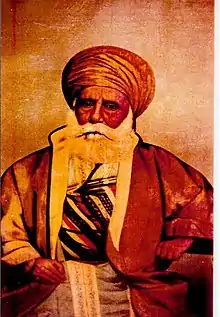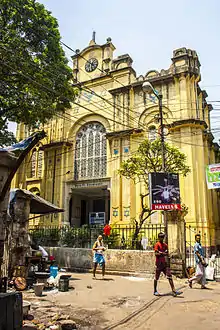David Joseph Ezra
David Joseph Ezra (died 1882) was a leading merchant, property developer and communal leader of the Baghdadi Jewish community in Kolkata, India. Ezra was one of the key developers behind nineteenth century Kolkata and his considerable architectural legacy in the city takes the form of many of its most celebrated Victorian buildings and synagogues.


Family
David Joseph Ezra was an Indian Ocean and South China Seas trader. Born in Baghdad, he established in Kolkata and traded heavily with China and the Arab world. His initial wealth grew principally out of his role as indigo, silk and optimum trader. Not only did his firm trade heavily with British, Indian and Chinese clients but Ezra acted as an agent for Arab ships arriving in colonial Kolkata from Muscat and Zanzibar.[1]
Ezra's eldest son was Elias David Ezra, who built[2] the Magen David Synagogue in 1884[3] in honour of his father.[4] His grandson was Sir David Ezra.
Property Development
Ezra owned the Esplanade, Ezra and Chowringhee Mansions, and Ezra Terrace. Ezra Street in Calcutta was named after him.[3] By the time of his death he was the largest property owner in the city.[4]
Jewish Community
With his fellow Baghdadi Jewish community leader Ezekiel Judah he built the Beth El synagogue in 1856 on Pollock Street.[5]
Death
David Joseph Ezra died in 1882.[4]
See also
References
- "Recalling Jewish Calcutta | David Joseph Ezra, Business · 03 Notable Members of and from the Community". www.jewishcalcutta.in. Retrieved 9 February 2020.
- "Calcutta". Joseph Jacobs & Joseph Ezekiel, jewishencyclopedia.com Retrieved 6 September 2015.
- Chakraborty Lahiri, Samhita (25 April 2010). "Jewish jewels". The Telegraph. Calcutta. Retrieved 14 September 2018.
- David Joseph Ezra. Archived 4 March 2016 at the Wayback Machine Recalling Jewish Calcutta: Memories of the Jewish community in Calcutta. Retrieved 6 September 2015.
- Muslim families look after Kolkata synagogues. Priyanka Borpujari, Al Jazeera, 13 Oct 2014. Retrieved 6 September 2015.